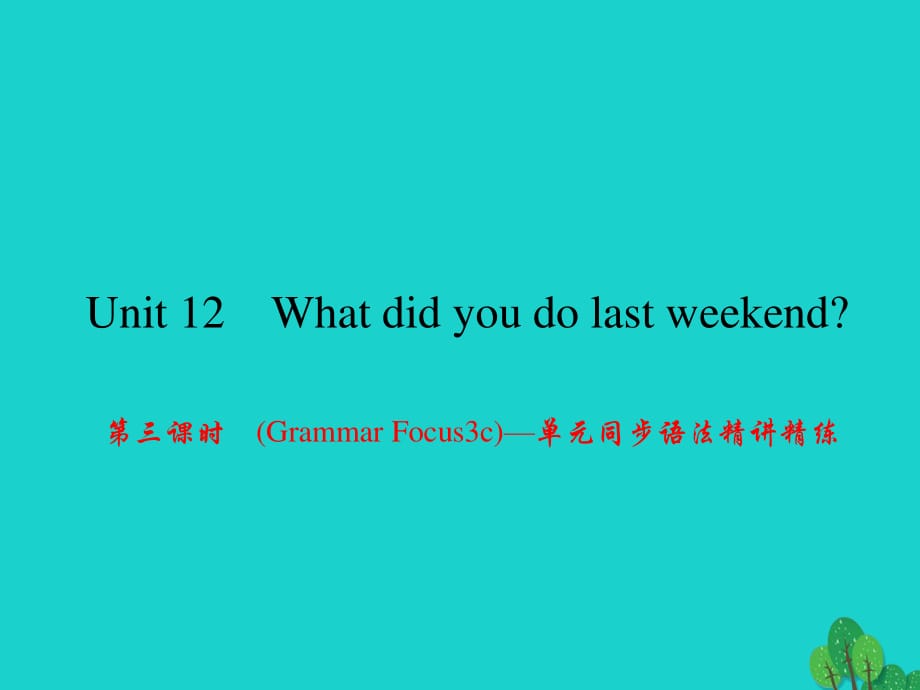《七年級(jí)英語下冊(cè) Unit 12 What did you do last weekend(第3課時(shí))(Grammar Focus-3c)同步語法精講精練課件 (新版)人教新目標(biāo)版.ppt》由會(huì)員分享,可在線閱讀�����,更多相關(guān)《七年級(jí)英語下冊(cè) Unit 12 What did you do last weekend(第3課時(shí))(Grammar Focus-3c)同步語法精講精練課件 (新版)人教新目標(biāo)版.ppt(9頁(yè)珍藏版)》請(qǐng)?jiān)谘b配圖網(wǎng)上搜索����。
1、第三課時(shí) (Grammar Focus3c) 單元同步語法精講精練 Unit 12 What did you do last weekend? 一般過去時(shí)的特殊疑問句 特殊疑問詞 對(duì)人提問用 who/whom�����;對(duì)物提問用 what��;對(duì)地點(diǎn)提問用 where���;對(duì)時(shí)間提 問用 when/what time�;對(duì)原因提問用 why��;對(duì)情況���、感受等提問用 how���。 結(jié)構(gòu) (1)含 be動(dòng)詞的特殊疑問句:特殊疑問句 was/were主語其他���? eg: Where were you last week?上周你在哪兒��? How was your last summer vacation���?你去年暑假過得怎樣?
2�、(2)含實(shí)義動(dòng)詞的特殊疑問句:特殊疑問詞助動(dòng)詞 did主語動(dòng)詞原形 其他? eg: What did Mike do yesterday afternoon�?昨天下午邁克做了什么? When did Tony start to play the guitar����?托尼什么時(shí)候開始彈吉他的? 巧記不規(guī)則動(dòng)詞的過去式 (1)動(dòng)詞過去式與原形一樣 ���, 如: putput �����, letlet �, readread ���, cutcut ����, hurthurt 。 (2)動(dòng)詞過去式以 ought結(jié)尾 ���, 如: thinkthought ���, buybought , bringbrought �����, fightfought
3���、 ���。 (3)動(dòng)詞過去式以 aught結(jié)尾 , 如: teachtaught ��, catch caught ���。 (4)動(dòng)詞原形末尾的 ow/ aw�, 大多變?yōu)?ew, 如: knowknew ���, growgrew ��, throwthrew ���, drawdrew 。 (5)將動(dòng)詞原形中的 ee變?yōu)?e�����, 詞尾加 t����, 如: keepkept ���, feelfelt �, sleepslept �, sweepswept 。 (6)將動(dòng)詞原形末尾的 d變?yōu)?t��, 如: buildbuilt ��, lendlent , sendsent ����, spendspent 。 (7)將動(dòng)詞原形中的 i變?yōu)?a或 o�,
4、如: ringrang ��, sitsat ��, drinkdrank �����, singsang �����, swimswam �, beginbegan , givegave ����, riderode , drivedrove �, writewrote �。 一般過去時(shí)的判斷 (1)當(dāng)句中有表示過去的時(shí)間狀語時(shí) �, 用過去時(shí) 。 這樣的狀語有: yesterday��, 如: yesterday morning昨天早上 �, at five oclock yesterday昨天 五點(diǎn)鐘 。 last�, 如: last week上周 , last year去年 ���, last Sunday afternoon上個(gè)星期 天下午
5�����、 。 ago���, 用 “ 一段時(shí)間 ago”表示 “ 多久以前 ” ���, 如: ten years ago十年前 。 過去的時(shí)間短語 ��, 如: in the 1990s在二十世紀(jì)九十年代 �, on May 1st 1892在 1892年 5月 1日 �, in the old days在那些過去的日子里等 �����。 (2)根據(jù)句意確知某一動(dòng)作發(fā)生在過去時(shí) �����, 用一般過去時(shí) �����。 eg: Edison invented many useful things.愛迪生發(fā)明了許多有用的東西 ����。 一 、 句型轉(zhuǎn)換 �����。 1 Tina stayed at_home last night.(對(duì)畫線部分提問 ) ______
6�����、_____ Tina ______ last night? 2 They went_to_the_movies last Saturday.(對(duì)畫線部分提問 ) __________ they _____ last Saturday? 3 The weather there was windy (對(duì)畫線部分提問 ) ___________ the weather there? 4 Ann went to the mountain by_car (對(duì)畫線部分提問 ) ___________ Ann _____ to the muntain? 5 She went there with her_f
7、riend (對(duì)畫線部分提問 ) _________ she ______ there with? Where did stay What did do How was How did go Who did go 二�����、用括號(hào)內(nèi)所給單詞的適當(dāng)形式填空�����。 6 My parents _______(go) to Beijing a week ago. 7 We _______(take) a long bus ride to a lake yesterday. 8 Where _____ your sister ______(visit) yesterday? She _________(visit
8���、) the farm. 9 Who __________(teach) you English last year? 10 When ______ your mother ______(buy) the pink dress? went took did visit visited taught did buy 本課時(shí)其他知識(shí)點(diǎn)精講精練 away副 詞 ���, 意為“離開;遠(yuǎn)離”�。 run (go) away跑 (走 )開; far away遠(yuǎn)離�;在遠(yuǎn)處; right away立刻�����;馬上���; put away把 收拾好; far away from離 遠(yuǎn) (away可省略 ) mouse名詞 , 意
9����、為“老鼠” , 其復(fù)數(shù)為 mice�。 baby名詞 , 意為“嬰兒” ����, 其復(fù)數(shù)形式為 babies, 也可作形容詞 �, 意為 “幼小的”。 shout at.沖 大聲叫嚷 (表示因生氣等對(duì)某人吼叫 ) shout to.對(duì) 大聲喊叫 (表示因距離遠(yuǎn)對(duì)某人大聲喊話 ) 1 Lucy can speak two ___________(語言 ) 2 Tim has a big family.He has two _______(baby) sisters. 3 There are two _________(mouse) under the table. 4 Dont ______________(走開 ) I want to talk to you. languages baby mice go/run away
 七年級(jí)英語下冊(cè) Unit 12 What did you do last weekend(第3課時(shí))(Grammar Focus-3c)同步語法精講精練課件 (新版)人教新目標(biāo)版.ppt
七年級(jí)英語下冊(cè) Unit 12 What did you do last weekend(第3課時(shí))(Grammar Focus-3c)同步語法精講精練課件 (新版)人教新目標(biāo)版.ppt

